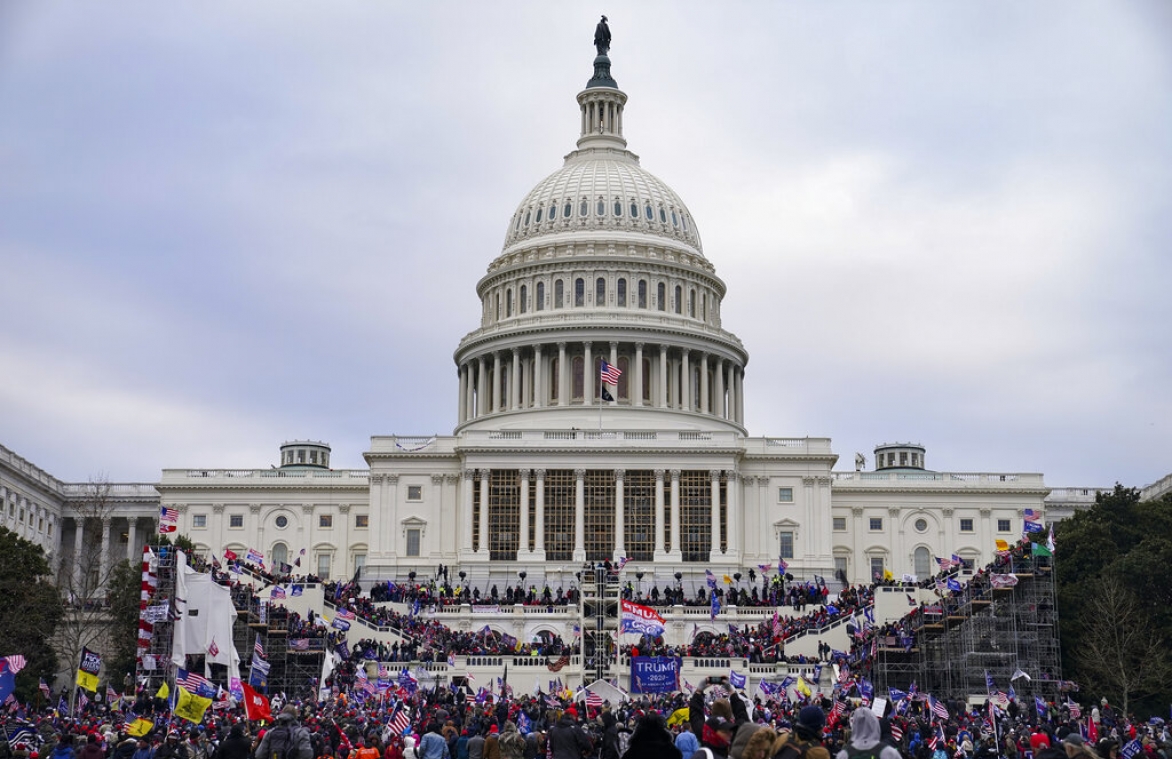By COLLEEN LONG and MICHAEL KUNZELMAN, Associated Press
WASHINGTON (AP) — Rejecting the recommendation of prosecutors, a federal judge sentenced a Jan. 6 rioter to probation on Oct. 1 and suggested that the Justice Department was being too hard on those who broke into the Capitol compared with the people arrested during anti-racism protests following George Floyd’s murder.
U.S. District Judge Trevor McFadden questioned why federal prosecutors had not brought more cases against those accused in 2020 summertime protests, reading out statistics on riot cases in the nation’s capital that were not prosecuted.
“I think the U.S. attorney would have more credibility if it was even-handed in its concern about riots and mobs in this city,” McFadden said during Danielle Doyle’s sentencing for entering the Capitol on Jan. 6 with a throng of other rioters. Prosecutors recommended two months of home confinement for Doyle, who is from Oklahoma.
The statements by McFadden, an appointee of former President Donald Trump, were a major departure from the other federal judges overseeing insurrection cases so far, even with other Trump appointees on the court assigned to the hundreds of cases. They have generally discussed seriousness of the crime and its unique place in American history — different from other violent free-speech protests because it sought to disrupt the peaceful transition of power.
The Associated Press analyzed more than 300 criminal cases stemming from the protests incited by Floyd’s murder, showing that many leftist rioters had received substantial sentences, rebutting the argument that pro-Trump defendants were treated more harshly than Black Lives Matter protesters.
As McFadden sentenced Doyle, he said he thought she was “acting like all those looters and rioters last year. That’s because looters and rioters decided the law did not apply to them.”
Despite these concerns, McFadden said Doyle’s behavior was not excusable. He called it a “national embarrassment,” and again likened it to the police-brutality protests following the death of George Floyd last year that made “us all feel less safe.”
By contrast, U.S. District Judge James Boasberg on Oct. 1 sentenced another rioter, Andrew Ryan Bennett, to three months of home confinement, accepting the request by prosecutors. Bennett was said to have espousing conspiracy theories about the election and used “pugnacious rhetoric” in posting about his plans to be in Washington. The mob on Jan. 6 attacked and beat an overwhelmed police force, sent lawmakers running for their lives and caused more than $1 million in damage to the building.
“I can’t emphasize enough, as I’ve said before, that the cornerstone of our democratic republic is the peaceful transfer of power after an election,” the judge told Bennett. “And what you and others did on Jan. 6 was nothing less than an attempt to undermine that system of government.”
Earlier this week, Boasberg, appointed by former President Barack Obama, sentenced Derek Jancart and Erik Rau, friends from Ohio, to 45 days in jail.
All three men had pleaded guilty to misdemeanors punishable by a maximum of six months’ imprisonment. Like Jancart and Rau, Bennett wasn’t accused of personally engaging in violence or property destruction.
Bennett said he was not thinking clearly and was “pumped up on adrenaline” when he joined the mob that stormed the Capitol after driving to Washington from his home in Columbia, Md., that morning.
“What I did was wrong and I hold myself accountable for my actions that day,” he said.
Doyle, too, was not accused of violence in the mob. She climbed through a broken window and spent 24 minutes inside the building. She told the judge she had no intention of harming anyone, and she was sorry that a peaceful rally changed when people started breaking into the building.
“I love this country,” she said. “So many people came here to represent things that were important to us but in the blink of an eye, all of those things were overshadowed,” she said. “For that I’m sorry, because it overshadowed the things that were good.”
Meanwhile, a retired U.S. Special Forces soldier and onetime Florida congressional candidate was arrested for his role in the riot. Jeremy Brown was accused of a misdemeanor charge of entering restricted grounds. FBI officials received photos of Brown in tactical gear at the Capitol from an acquaintance of Brown’s, and a rioter who pleaded guilty also confirmed to agents that Brown was there, according to court papers. He has said that federal officials called him and tried to get him to inform on others.
Brown ran for Congress in 2020 as a Republican in the 14th District, which includes Tampa and the surrounding area, but dropped out of the race in March 2020.
Kunzelman reported from College Park, Md.
The Free Speech Center newsletter offers a digest of First Amendment and news media-related news every other week. Subscribe for free here: https://bit.ly/3kG9uiJ

